- Home
- Susan Hill
The Boy Who Taught the Beekeeper to Read: And Other Stories Page 5
The Boy Who Taught the Beekeeper to Read: And Other Stories Read online
Page 5
‘They neither need nor want us,’ Nita said, ‘that much is clear without anything being said.’
They felt invisible, quite supplanted, quite irrelevant. One evening they drew a circle on the street map, and began to look within it. They could not have borne to change their routine, the walk to the same bus stop, the return together. It was all that was left to them, apart from their jobs, and their own shared life.
When they found a flat which would do, Kay told their father, who said nothing. ‘You have your own lives to lead,’ their stepmother said brightly; ‘naturally you do.’
The flat was really quite pleasant. The sitting room had wide windows overlooking the chestnut trees that lined the quiet street. The rooms were freshly painted. They grew used to not having a garden, particularly as it was winter when they moved in.
They wondered from time to time whether they had judged Leila Crocker, as they still thought of her, correctly, whether she had cornered their father into a meeting, marriage, the clearing away of his past, or whether she had in fact been blameless and the fault was his, but it came to matter less and less just as, to their surprise, they were able to remember their mother more clearly in the flat than they had in the old house. She had come with them, she was there every evening on their return, in her photograph, which was everywhere, and with her invisible yet smiling, patient presence.
They thought as little as possible about their father and their old home, though it was the memories of home which gave them the greatest pain, striking without warning, because of the way the sun shone suddenly through a window, or the banging of a gate. At these moments, the past would wash over them and drown them in itself. Their years of childhood and young womanhood were fresher and more vivid than the previous day so that it seemed they might simply have opened the door and walked back into them.
Their habits firmed, hardened, their natures set.
Routine became all-important. They came to dread any disturbance, any hint of the unfamiliar.
Their father’s new marriage had nothing to do with them.
‘It is far better,’ Kay said; ‘it is the only way.’ And all the while believed it.
But very occasionally, Nita got up before her and went to the early service. Kay could never be persuaded. It was the only rift between them, and slight enough, apart from the day Nita let the blue ribbon teapot slip out of her hands onto the floor of the kitchenette, where it smashed into far too many pieces for there to be the slightest hope of repair. Walking into the room a moment later, Kay found her sister standing, staring down at the shards of china and, recognising them, she began to scream, furiously, uncontrollably, her voice rising and rising, until Nita’s face took on a look of pain, and panic, and, as Kay’s scream intensified, of fear.
Need
Need
One of the Morris kids had let Rosa’s hen out and was chasing the poor flapping thing round, both of them squawking together and mud flying.
That’s all the site was that year, mud. We were in it for a month and I think it rained every day. At night I lay in the bunk and went to sleep to it, slamming on the van roof and rolling down the sides.
‘Get off. Get away.’ I couldn’t catch him of course. He ducked and dived off. All the Morris kids are quicksilver, it’s in them to be. But I got the hen without much trouble. She just cowered in the mud and let me pick her up and, when I held her funny, soft, wet body between my hands, went very still.
Then it came.
‘Hooey – oo. Hooey – oo.’
I froze like the hen, waiting.
‘Hooey – Ssssss . . .’
I couldn’t see him and in any case he was clever at throwing his voice. I held onto the hen tighter for comfort.
‘Hooey – oo.’ No one else would have heard it. He whistle-whispered in a queer, sing-song way. It made my neck prickle.
I hated him. Little Midge, the whistler, somewhere here, pressed up against one of the vans, or in the dark slit between two of them, or skulking behind a tent flap.
Rosa’s hen jerked its head round suddenly and I saw its unblinking little eye, round as a button. Something in the gleam of it gave me nerve and I walked wildly round the back of Rosa’s van, opened the door of the cage slung below it and bundled the hen in. Rain dripped from the overhead awning down my back.
From somewhere close by a baby set up a wail and that started another, and set the ponies off one by one, geeing and braying and whinnying.
I found that one of the worst things. That it was never quiet. I’d been born into it and grown up with it and never accepted it. There’s always a racket, day and night, children, animals, musicians, all jammed together, living and breathing and playing and fighting in one place. I used to walk away sometimes, along the cliff path and down onto the secret beach, just to get away from it. To get some quiet. The sea was never quiet, but that was different. The sea was a peaceful noise.
Otherwise, and when we were in other places where escape was not so easy, I had to make do with going to Rosa. I did that now, once I’d stuffed the bird back in its cage.
The van was dark, as it always was. The only light came when you opened the door curtain to climb in and a slant of it cut through the felty oil-filled blackness.
She had the lamp on, a painted metal one that stood behind her back, and another hanging from a hook in the ceiling. There was one on her fortune-telling table too, but that was only lit when she was working.
If I close my eyes I can smell the smell inside that van, the oil and the sweet heavy smell from the little pots of dried stuff Rosa burned, and Rosa’s sweat. She wasn’t exactly dirty but she didn’t change her black clothes often either. I can feel the thick darkness like wool on my skin. I didn’t need a light in there any more than Rosa did, I knew my way by feel. There was no spare space. Hers was one of the last of the old vans, the barrel sort with steps up the painted sides. Everyone else had modern vans.
Rosa was lying on her back and she had her wig off. I could see it hanging up with the black veil and its gold coins attached.
‘One of the Morris kids had let the hen out,’ I said. ‘I’ve put her back now.’
I sat down on the stool under the cabinet. The glass and china caught the light from the oil lamps here and there.
Rosa’s cabinet was her pride.
‘I’m not well, Biddy.’ And her voice sounded odd. I could see her now my eyes had got used to the half-dark. She was curled up facing me. The knitted blanket pulled round her neck. Her bald head shone like the china plates.
‘What’s wrong? I’d better fetch Ma.’
‘Your Ma can’t do anything.’
‘Was it something you ate?’
‘No.’
‘Shall I make you a cup of tea then?’
We always had tea. Partly for itself, and then for Rosa to tell my future in the leaves. I think she practised on me.
She’d tell me what sort of day I’d had, whichever school I happened to be going to at the time. It wasn’t easy, changing schools every few weeks, leaving one, starting another, then going back all over again. Rosa would make the tea leaves reassuring to help me.
But she didn’t want any tea, she said.
‘Just sit quiet with me, Biddy.’
Well, I was happy with that and we stayed quiet for a long time. The rain dripped on the roof and now and then someone called out but it seemed far away and the ponies had settled down again. Once I re-frayed the wick and pumped the lever to make the oil lamp flare.
Rosa’s breathing sounded harsh as shaken nails.
I said, ‘Little Midge was out here. Before.’
She was the only one I’d been able to tell about him, how the queer, soft whistle-whispering would come after me, now here, then there, to confuse me. How he’d creep up on me between the vans or behind the lav tents, how his eyes glistened. How I hated his stumpy dwarf body and old man’s head. Rosa had told me once that Little Midge’s father had been a true gentleman and tha
t his mother had only one eye – not that the other was blind, there was no other. Just a flat place where an eye should have been. There had been four others in the family like him, cousins and uncles. They had made a fortune at Christmas in pantomimes.
‘Always in demand, rich men.’
‘He makes me shudder.’
‘The others were clever as paint, but Little Midge was never clever, only cunning.’
It was true he had never touched me, never done anything to me at all but whistle-whisper, and back me up in some corner where I could see his big head and leery old man’s face too close and smell his sour breath.
‘If I told Da, Da might kill him.’
‘It’s happened.’
‘Da?’
‘No. Others. Killings. Scores get settled.’
I knew that was so. There were rows and shouting often enough, women being hit and hitting back. Fights on the open bit away from the vans. People sorted themselves out. But I was Da’s future. He had hopes for me. Not that his hopes were my own. They I didn’t like the way she was lying, her knees drawn up so tightly. I bent nearer. Without her wig, she looked very old. I had never attached any age to her: age and Rosa had had nothing to do with one another somehow, partly because she lived half of her life in the future, seeing it in the crystal ball and the leaves, and the lines on people’s palms, and the other half in the past, listening to the dead, so that there seemed scarcely a time for her to have any existence in the present.
I didn’t like her to talk about the dead. It troubled me. I think I even found it embarrassing. I just could never be sure. Rosa respected that, and hardly ever mentioned it.
But now, the future and the past had suddenly changed, telescoped together and shrunk to the now; everything was now, concentrated on a bald old woman curled in a bunk in the oily half-light.
‘Do you have a pain in your stomach?’
But she only gave a little groan and pulled herself together more tightly as if she was afraid of coming apart.
Through the slit in the curtain I could see a coloured haze of light from the fairy lamps strung all round the tent. In an hour the crowds would be in for the show. I wondered what Rosa would do, whether she had ever missed an evening before. At the start, and in the interval and again at the end there were always one or two waiting to see her, sometimes a lot more. She had a reputation.
‘You read your book,’ she said suddenly. ‘Yes.’
I didn’t need Rosa to tell me that. I read my books in preparation for my own particular future, when I would get away from the racket and the smell and Little Midge’s whistle-whisper, and the prospect of marrying one of the Morrises or Alfie the fire-eater.
‘Don’t you get into trouble . . .’
‘Ma knows where I’ll be.’
She always did, and complained about it bitterly. I thought she was jealous of the time I spent with Rosa.
‘Shouldn’t I fetch someone?’
But she rolled her bald head fretfully to and fro on the pillow.
In the end, I got a cup of water and set it by the lamp on the ledge behind her bunk, and made her promise to call if she needed anything.
‘I’ll hear,’ I said, though I never would once the show had begun. I could hear the drum roll practice starting up, and then the sudden blaze of the trumpet. Then the horses began again.
I didn’t want to leave her. I hated it. This. It wasn’t how things should be in Rosa’s van. We hadn’t talked, there had been none of her quiet murmuring over the tea leaves. I hadn’t sat with my hand, palm up, resting in her dry one, listening. I hadn’t told her any stories about the day. We hadn’t had a laugh.
She fed off me, I sometimes thought, for a taste of the world outside.
And I didn’t want to go out in case Little Midge was here, silkily whistle-whispering. If I waited a bit longer he’d be gone to get ready. I hated him in his spangles and make-up, his old man’s face more peculiar than ever, but in the ring he was away from me, under the floodlights, fully visible.
I waited as long as I dared. It was peaceful in Rosa’s van, but I didn’t feel right, the sense of ease wasn’t here. I was jumpy, as if something was about to happen.
Rosa was asleep now. I didn’t want to kiss her but I touched her hot forehead. It was dry as a moth.
When I stood up her wig brushed against my face.
The site had that buzz there always is before a show. Van doors opened in your face and people came flying out, in macs and boots over their costumes, trying to dodge the mud and puddles, the horses were all wound up, and Mario’s dogs were yapping. The warm-up magic started. This was the time I liked it, the only time, but it churned you up too. It was the danger. There was always that. People could fall. People broke their backs. People had died. I’d heard the stories often enough – ropes giving way, platforms in the roof not secured. The stunt rider who went round and round two feet up, until the day his engine cut out.
Little Midge wasn’t there, but I was still jumpy, so that I went up to my calf in muddy water when I heard a whistle behind me, but it was a normal whistle from Johnny Mahoney, carrying his whips under his arm. If there was one person I liked better than any, apart from Rosa, it was Johnny Mahoney. When I was young he used to sit on the top step of his van and tell me Bible stories. He used to say there was always the Boss looking out for me. I had only to give him the nod if I had a problem and he would sort it out. It was something I tried to remember when Little Midge was out there somewhere whistle-whispering.
Johnny Mahoney’s wife had died of cancer years before. I hardly remembered her. He kept a shrine to her memory in his van, her photograph among plastic flowers, with a candle in a little ruby-red glass. Her funeral was still talked of as something wonderful to behold – with her name, and a full-size trapeze in white flowers carried on one of the lorries, and every horse and pony wearing black wreaths around their necks, and black ribbons.
‘Toodle-oo,’ Johnny Mahoney said.
I stopped. I wanted to tell him about Rosa, and for a moment, standing in the rain with my leg soaked in muddy water, I almost did.
But she had said not, and although it troubled me, I had to respect it, so I just said ‘Toodle-oo’ back, as usual.
Ma was in a pot-banging mood. You could have put a match to the fury in the air. Why it took her was one of the mysteries, and you could never predict when. It was hard to live at close quarters with, so generally I went straight to Rosa’s. Now, I just got a glass of water and my book, and went to my bunk, trying to be invisible.
When I lay down, Rosa was in my mind at once. I saw her bald head and her body curled and arched like a caterpillar. The worry of it sat heavy and burning like a coal in the middle of my chest, and I needed to halve the burden of it with someone. But a plate had smashed into the sink and as soon as Da came in the row started, as it was bound to do, she screaming at him, on and on in her own furious unburdening. When I did get to sleep Little Midge’s whistle-whisper floated through my dreams.
There are plenty of sentimental stories about people running away to join the circus but I never heard one about the opposite. That night, I came as close as I ever had to going, without warning or preparation, which would have been more than foolish. I knew it had to be planned and done properly. I knew it was not yet.
The other thing that stopped me going was Rosa. I had the responsibility of that.
My neck ached when I woke, I’d been lying so awkwardly, the pillow half over my head. The light was opaque and velvety outside the van windows, which meant a sea mist had rolled up and over the site like a great eiderdown. Da was snoring and the plate was smashed, with the shards all over the sink and the draining board, ready to cut anyone’s finger open.
When I stepped outside it was eerie and deathly still. The sea mist touched my face and hair like cobwebs. I picked my way across the mud, feeling my path between the vans. Everybody’s curtains were drawn. A dog growled once. Nothing else.
So
metimes here on quiet early mornings you could hear the sea breaking on the rocks far below the cliffs, but not today. It might not have been there.
I almost tripped over the steps of Rosa’s van, I could see so little. The mist tasted of rust in my mouth. The steps were sweaty with it, so that I almost slipped.
I knew as soon as I parted the curtains. It was something about the silence. It had a different quality, as though every atom and particle within the van had fallen still and motionless.
I climbed carefully in, not wanting to disturb that stillness. My heart pounded in my ears as fast as castanets.
Only the lamp was still lit on the ledge along the bunk, and that had burned right down. Rosa was lying on her side almost as I had left her, but her knees were no longer drawn up, and her hand was up close to her face, beneath her cheek.
I knelt down beside her. ‘Rosa,’ I said.
My voice sounded too loud, breaking open the stillness.
‘Rosa.’
I was afraid to touch her at first, but then I did. The moth-wing skin of her forehead was cool. I kissed her, a thing I had never done, never would have thought to do, in her life.
I knew I would have to fetch help, but there was no hurry, and I didn’t want people to come crashing into the stillness for good. Once they had, nothing would ever be the same.
It was not the same now.
In the end, I did get up, and felt my way to the door.
‘Hoo-ee-ooo. Hoo-ee-oo. Ssssss . . .’
Something rose up inside me then, but it was not fear. It was anger, a fury which I recognised as my mother’s. It belonged within us both.
‘You stop that and come out here.’
My voice bounced oddly off the billowing sea mist.
‘Do you hear me?’
And suddenly, he was there, a yard or two away from me, his flat old man’s face opened wide in shock.
‘Rosa –’ I said, and stopped. I wasn’t going to tell him. ‘Rosa isn’t well. I’m going for someone. You stay here – right here.’ I pointed to a position at the bottom of the step. ‘You stand guard and don’t move – you don’t let anyone in there until I come back and you don’t go in there yourself. Do you hear?’

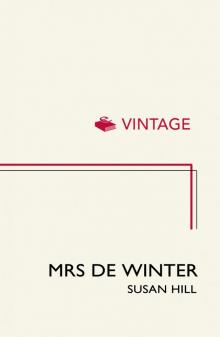 Mrs De Winter
Mrs De Winter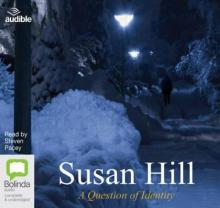 A Question of Identity
A Question of Identity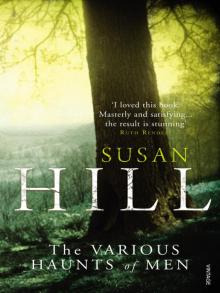 The Various Haunts of Men
The Various Haunts of Men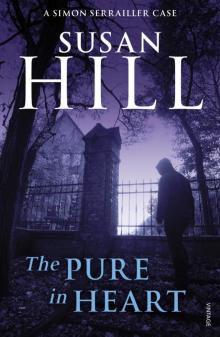 The Pure in Heart
The Pure in Heart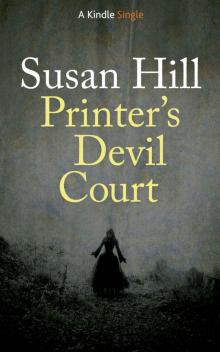 Printer's Devil Court
Printer's Devil Court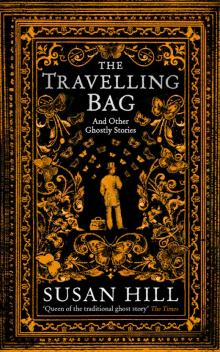 The Travelling Bag
The Travelling Bag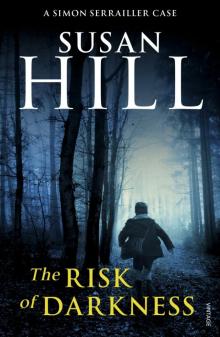 The Risk of Darkness
The Risk of Darkness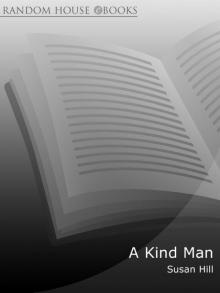 A Kind Man
A Kind Man Black Sheep
Black Sheep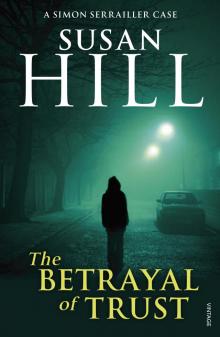 The Betrayal of Trust
The Betrayal of Trust The Service of Clouds
The Service of Clouds Betrayal of Trust
Betrayal of Trust The Small Hand
The Small Hand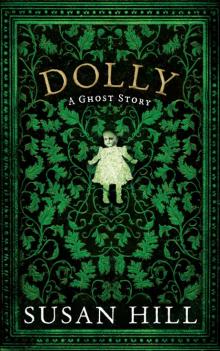 Dolly
Dolly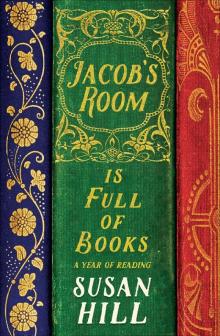 Jacob's Room Is Full of Books: A Year of Reading
Jacob's Room Is Full of Books: A Year of Reading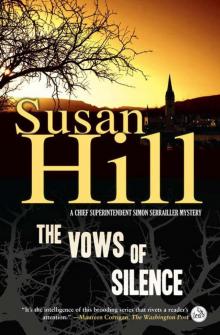 The Vows of Silence
The Vows of Silence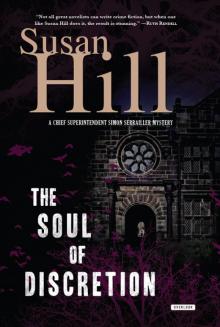 The Soul of Discretion
The Soul of Discretion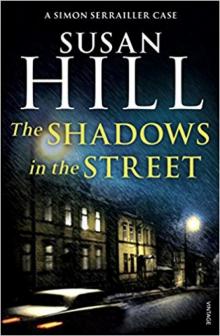 The Shadows in the Street
The Shadows in the Street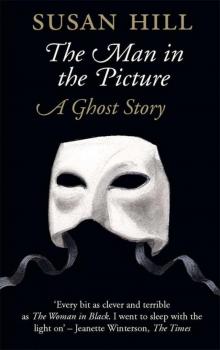 The Man in the Picture
The Man in the Picture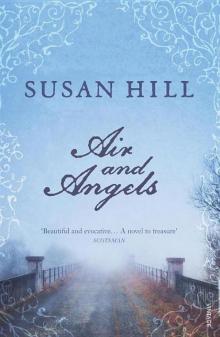 Air and Angels
Air and Angels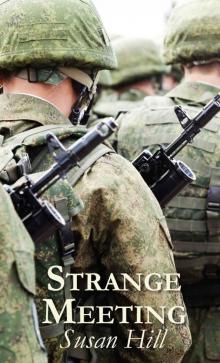 Strange Meeting
Strange Meeting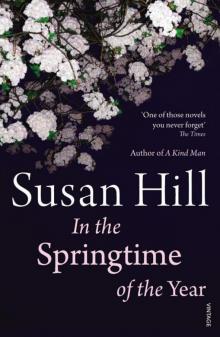 In the Springtime of the Year
In the Springtime of the Year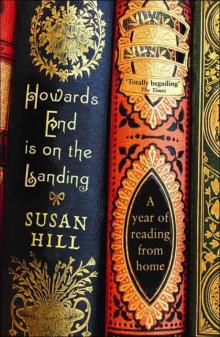 Howards End Is on the Landing: A Year of Reading From Home
Howards End Is on the Landing: A Year of Reading From Home From the Heart
From the Heart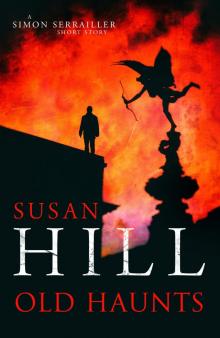 Old Haunts
Old Haunts The Mist in the Mirror
The Mist in the Mirror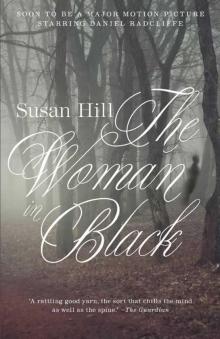 The Woman in Black: A Ghost Story
The Woman in Black: A Ghost Story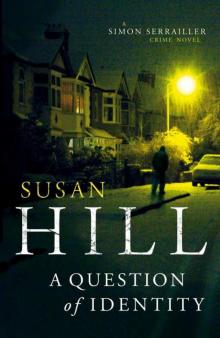 A Question of Identity (Simon Serrailler 7)
A Question of Identity (Simon Serrailler 7)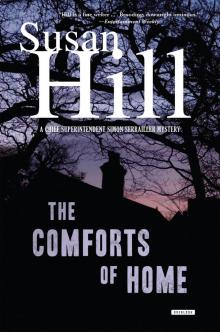 The Comforts of Home
The Comforts of Home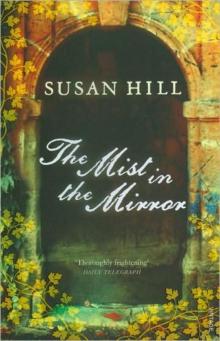 Mist in the Mirror
Mist in the Mirror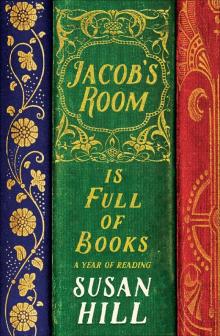 Jacob's Room is Full of Books
Jacob's Room is Full of Books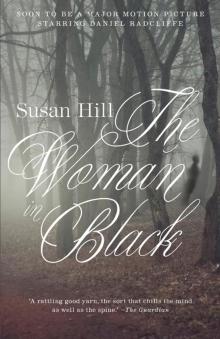 The Woman in Black
The Woman in Black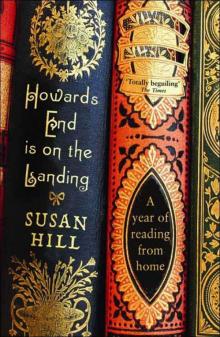 Howards End is on the Landing
Howards End is on the Landing